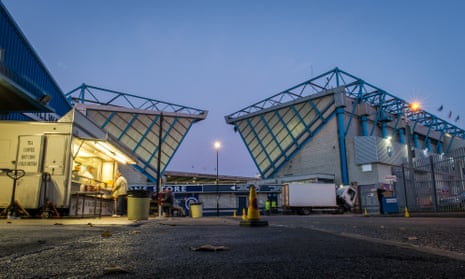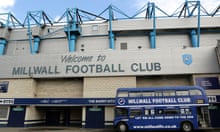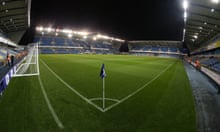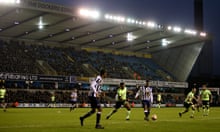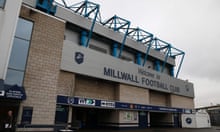Millwall Football Club have admitted for the first time that they may be forced to leave their south London home and relocate to Kent should the seizure of their land go ahead. Lewisham council’s plan to compulsorily purchase areas around the Den and sell them on to a mysterious offshore developer with connections to the current Labour administration has already drawn both disbelief and mass protest.
With the CPO likely to be confirmed at a council meeting next Wednesday Millwall have conceded publicly for the first time the club could have to leave the area that has been their home since 1910. In a statement Steve Kavanagh, their chief executive, told the Guardian: “The chairman has always been determined that this would never happen, but under such circumstances any and every option would have to be considered to secure the football club and the Millwall Community Trust’s future as viable concerns.”
Millwall have so far been cautious about conceding relocation might be the real threat. But with the community trust already set to be evicted and the club excluded from the benefits of the regeneration scheme, it also emerged last month that their academy may be unable to function under the current proposals.
There is no suggestion yet of a specific alternative site. The north Kent coast has been mentioned more broadly in the past, an uprooting that would see the club plonked down up to 75 miles from its historic home. Such a move would also be a stunning blow to Lewisham itself. A London borough with a population the size of Iceland would be left without a professional sports club of any kind.
Should the order be confirmed the ripples will be felt by other league clubs in areas where rising land prices are likely to attract developers with an eye on regeneration. Supporters of nearby Charlton Athletic and Leyton Orient will be watching with interest, as will other mid-size Football League clubs across the country.
Until now concerns over the Millwall land-grab have centred on the council’s historic relationship with the offshore developers Renewal. Renewal’s chief executive is a former Lewisham officer and colleague of the current Lewisham chief executive, Barry Quirk, an unelected official best known locally for being paid more pro rata than the prime minister for working a three day week. In another bizarre twist Renewal was also set up and originality part-owned by the previous Labour mayor of Lewisham, Dave Sullivan. Sullivan has stated he no longer has any part in the company, which is owned by two anonymous offshore trusts based in the Isle Of Man and the British Virgin Islands.
The chair of Lewisham’s own overview & scrutiny committee, Alan Hall, has been a lone voice inside the council with the courage to speak out against the CPO process. “Millwall Football Club are part of the cultural history of London and Lewisham with over 100 years in the borough,” Hall said. “Over the past five years Renewal’s original outline planning application has fallen apart in slow motion in front of our very eyes. The ever-shrinking proposed ‘sporting village’ will drive away one of football’s most famous clubs and its highly successful community scheme.”
The AMS Millwall supporters’ organisation has led the fight on behalf of the club’s fans. On Wednesday the AMS published its own open letter to Quirk, who has emerged as the driving force behind the scheme – the mayor, Sir Steve Bullock, having stepped back due the fact he is, astonishingly, director of a Renewal-associated company, the Surrey Canal Sporting Trust.
The AMS letter points to the alarming democratic deficit in Lewisham’s elected mayor system. The current setup, introduced as a Blair government initiative, has left the borough with a largely unregulated cabinet and a chief executive, in the shape of Quirk, who has no mandate, is electorally unaccountable, but is currently heading up a scheme that will evict local residents from their homes.
The letter also points out that the council’s attempts to provide reassurance on the probity of its plans in the form of an email from Mushtaq Malik, Renewal’s CEO, are likely to be met with derision. “Is it right,” the AMS asks, “that the council has been put in a position where its chief executive is reduced to publishing emails from a third party actively denying that inside deals, murkiness and personal relationships are in play?”
The AMS also voiced its own fears that offshore developers could be allowed to succeed where the Luftwaffe’s bombs and successive economic depressions have previously been staved off: “Failure to listen to genuine concerns could, we fear, lead to Millwall Football Club’s loss of academy status as recognised by the EFL and ultimately the club being forced to relocate from the London borough of Lewisham.”
The Liberal Democrat party has also called for the plans to be scrapped. “The only compelling case that’s been made is that this Renewal scheme will be a disaster for the local community.” Bobby Dean, Parliamentary spokesperson said. “Millwall FC is the largest sporting asset Lewisham has and their future cannot be jeopardised by this luxury scheme with no regard to affordable housing. Lewisham should withdraw the plans and start again – this time properly involving the football club and local community.”
- This article was corrected on Friday 6 January 2017 to reduce the number of miles Millwall could move to Kent from 100 miles to 75
